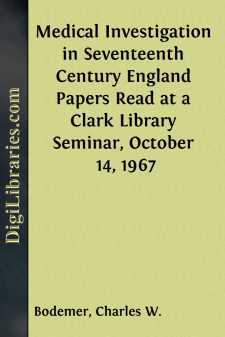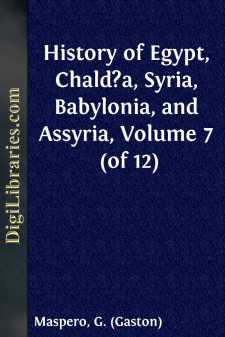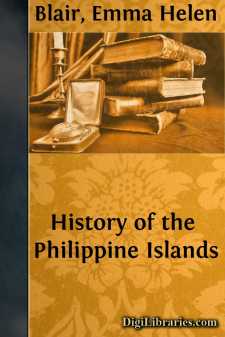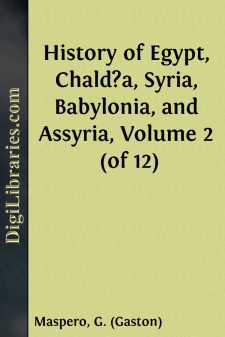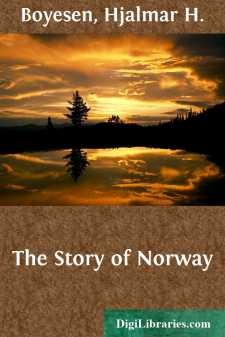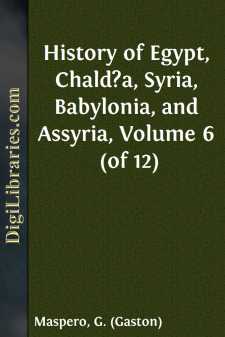History
- Africa 30
- Americas (North Central South West Indies) 50
- Ancient 68
- Asia 58
- Australia & New Zealand 8
- Canada 41
- Caribbean & West Indies 1
- Civilization 20
- Eastern Europe 12
- Europe 310
- Expeditions & Discoveries 60
- General 77
- Historical Geography 1
- Jewish 9
- Latin America 3
- Medieval 8
- Middle East 13
- Military 248
- Revolutionary 8
- Study & Teaching 5
- United States 353
- Western Europe 56
- World 13
History Books
Sort by:
To discuss embryological thought in seventeenth-century England is to discuss the main currents in embryological thought at a time when those currents were both numerous and shifting. Like every other period, the seventeenth century was one of transition. It was an era of explosive growth in scientific ideas and techniques, suffused with a creative urge engendered by new philosophical insights and the...
more...
CHAPTER I—THE ASSYRIAN REVIVAL AND THE STRUGGLE FOR SYRIA Assur-nazir-pal (885-860) and Shalmaneser III. (860-825)—The kingdom of Urartu and its conquering princes: Menuas and Argistis. Assyria was the first to reappear on the scene of action. Less hampered by an ancient past than Egypt and Chaldæa, she was the sooner able to recover her strength after any disastrous crisis, and to assume again...
more...
by:
Henry Morley
INTRODUCTION. Again, on behalf of readers of this National Library, I have to thank a poet of our day—in this case the Oxford Professor of Poetry—for joining his voice to the voices of the past through which our better life is quickened for the duties of to-day. Not for his own verse only, but for his fine sense also of what is truest in the poets who have gone before, the name of Francis Turner...
more...
by:
Emma Helen Blair
PREFACE In this volume is presented the first installment of Dr. Antonio de Morga's Sucesos de las Islas Filipinas. Events here described cover the years 1493-1603, and the history proper of the islands from 1565. Morga's work is important, as being written by a royal official and a keen observer and participator in affairs. Consequently he touches more on the practical everyday affairs of...
more...
CHAPTER I THE HISTORIOGRAPHER'S ART IN OLD JAPAN MATERIALS FOR HISTORY IN the earliest eras of historic Japan there existed a hereditary corporation of raconteurs (Katari-be) who, from generation to generation, performed the function of reciting the exploits of the sovereigns and the deeds of heroes. They accompanied themselves on musical instruments, and naturally, as time went by, each set of...
more...
CHAPTER I—THE POLITICAL CONSTITUTION OF EGYPT The king, the queen, and the royal princes—Administration under the Pharaohs—Feudalism and the Egyptian priesthood, the military—The citizens and country people. Between the Fayûm and the apex of the Delta, the Lybian range expands and forms a vast and slightly undulating table-land, which runs parallel to the Nile for nearly thirty leagues. The...
more...
by:
Charles Darwin
After having been twice driven back by heavy south-western gales, Her Majesty's ship Beagle" a ten-gun brig, under the command of Captain Fitz Roy, , sailed from Devonport on the 27th of December, 1831. The object of the expedition was to complete the survey of Patagonia and Tierra del Fuego, commenced under Captain King in 1826 to 1830--to survey the shores of Chile, Peru, and of some islands...
more...
CHAPTER I—EGYPT UNDER THE ROMAN EMPIRE The Roman dominion on the Nile: Settlement of the Egyptian frontiers: Religious developments: Rebellions. Augustus began his reign in Egypt in B.C. 30 by ordering all the statues of Antony, of which there were more than fifty ornamenting the various public buildings of the city, to be broken to pieces; and it is said he had the meanness to receive a bribe of one...
more...
PREFACE. It has been my ambition for many years to write a history of Norway, chiefly because no such book, worthy of the name, exists in the English language. When the publishers of the present volume proposed to me to write the story of my native land, I therefore eagerly accepted their offer. The story, however, according to their plan, was to differ in some important respects from a regular...
more...
CHAPTER I—THE CLOSE OF THE THEBAN EMPIRE—(continued) Ramses III.: Manners and Customs—Population—The predominance of Amon and his high priests. Opposite the Thebes of the living, Khafîtnîbûs, the Thebes of the dead, had gone on increasing in a remarkably rapid manner. It continued to extend in the south-western direction from the heroic period of the XVIIIth dynasty onwards, and all the...
more...


